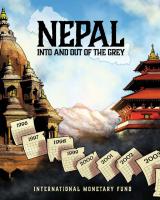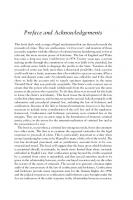Nepal : Defending Against Money Laundering 9781484350836, 1484350839
281 65 8MB
English Pages [20] Year 2018
Cover
NEPAL: DEFENDING AGAINST MONEY LAUNDERING: INTO AND OUT OF THE GREY
THE TEAM
NEPAL
IMF STAFF
IMF CAPACITY DEVELOPMENT
IMF REGIONAL CAPACITY DEVELOPMENT CENTERS
ABOUT THE INTERNATIONAL MONETARY FUND
ABOUT THE AUTHORS
Recommend Papers

- Author / Uploaded
- Joe Procopio
File loading please wait...
Citation preview
Script by Joe Procopio and Amit Khetarpaul Art by Steve Conley and Rick Veitch of Eureka Comics
©2018 International Monetary Fund. All rights reserved. For permission to reproduce, photocopy, excerpt, or translate this work, submit a request via online form (www.imf.org/external/terms.htm) or email to [email protected]. Permissions for commercial purposes are also available from the Copyright Clearance Center (www.copyright.com). ISBN: 978-1-4843-5144-4 The views expressed in this publication are those of the author(s) and do not necessarily represent the views of the IMF, its Executive Board, or IMF management.
Into and Out of the GREY Nepal. Himalayan nation with deEp history and culture.
Nepal: Defending against money laundering Misfortune plagued this beautiful nation for 20 years.
1
Civil unrest turned to conflict and political insurgency.
Clashes continued for the next decade, taking a heavy tolL on the society.
People in the countryside fled from violence. Nearly 20,000 were kilLed or misSing. Another 200,000 were displaced from their homes.
Many more migrated to safer havens abroad.
2
Peace, finalLy.
Nepal now confronted its next chalLenge: How to recover from a lost decade of economic growth.
Elsewhere, the world was cracking down on terRorism.
The inter-governmental Financial Action Task Force (FATF)* was isSuing “blacklist” reports on countries deEmed unprepared or uncoOperative in the global fight against terRorist financing and money laundering.
Nepal received distresSing news: It was placed on the FATF’s “grey list,” a step away from a blacklisting that carRied dire economic consequences. C H IN A
IN D IA
NE PA L
B H U TA N BANGLADESH
* Established by the 1989 G-7 Summit in Paris, the FATF and its affiliates monitor countries’ safeguards against money laundering and terrorist financing, and identify vulnerabilities for misuse of the international financial system.
3
Just that year, Nepal had created its financial intelLigence unit (FIU), a division within the Rastra Bank (Nepal’s central bank) meant to detect financial crimes, such as money laundering and terRorist financing.
The consequences of the “grey listing”? A posSible future blacklisting and losS of corRespondent banking* with many of the world’s major banks.
The gravity of the situation was initialLy understoOd only by a few civil servants in Nepal’s FIU, Rastra Bank, and Ministry of Finance.
*Correspondent banking involves agreements between foreign and domestic banks for handling international financial transactions and currency exchanges for customers.
4
Rishikesh BhatTa, former FIU Head
This is bad. Losing our ability to engage in correspondent banking means we will lose access to essential goods. Prices will rise, hurting living standards.
Falling onto the blacklist will make legitimate international trade nearly impossible and seriously hurt foreign investment.
We import more than 80 percent of our goods….Most of our everyday needs, basic food items, fuel, cars…all of this import activity is channeled through foreign banks.
The FATF’s grey listing was a public warning: Nepal must bring its financial oversight into compliance with international standards.
The economic impact of a blacklisting could be significant.
Nepal neEded adDitional expertise. 5
Cecilia Marian, IMF
Without correspondent banking, trade will eventually go underground, migrating to the grey market, where the government can’t measure or regulate it.
Exactly. If business shifts ‘off the books,’ our tax revenues will go down. The money we need to build schools, roads, and hospitals will dry up. Foreign investors will go elsewhere.
Patrick O’SulLivan, IMF
There are other consequences, too, like the impact on remittances.
A large number of Nepalis work in other parts of the world, such as the Middle East, and they send money back to their families.
If Nepal gets cut off from correspondent banking, those workers can't send money home.
More than 20% of Nepal’s GDP is remittance based, among the highest rate in the world. 6
Nepal’s FIU submitTed a formal request to the IMF, which had a special donor-backed fund dedicated to helping member countries improve their ability to fight money laundering and terRorism financing.
Except for a small group in the central bank and FIU, hardly anybody else knows about the FATF blacklist or what it means.
Then some of our initial work will have to focus on helping the FIU team highlight the seriousness of the situation.
The IMF team spent its first year spreading the word and asSesSing what laws, institutions and oversight toOls were in place.
7
Nepal’s political transition was stilL underway, which made the procesS difFicult.
EventualLy the Secretary of Finance and central bank Governor gained apProval from the cabinet for a plan co-developed by the Rastra Bank, the FIU, and the Ministry of Finance with help from the IMF.
Work proceEded in four areas: (1) developing a national strategy, (2) drafting new laws, (3) strengthening the FIU, and (4) developing a “risk-based” apProach to supervision.
Getting the laws in place is crucial.
8
They will serve as the foundation needed to build everything else. It’s complex and can take years. Having to write new laws from scratch takes resources and time.
Four years after being placed on the grey list, Nepal’s progresS was slow and sporadic.
Nepal was given a brief reprieve that alLowed the government to presS on with legal reforms.
When the FATF plenary met in 2012, only intense last-minute diplomatic efForts from international partners kept Nepal from falLing onto the blacklist.
Over the next few years, new laws, regulations, procedures and a dedicated investigation unit were created.
9
With support from the IMF and international partners, we were able to better organize the FIU and understand how to do this specialized work…. We developed manuals, trained staff, and created processes for issuing directives to banking institutions.
At various points, Nepal had serious, seemingly endless constitutional and governance problems.
They were really dealing with many constraints while juggling the fact that they were facing international scrutiny. The next priority: Strengthening the FIU.
To help it meEt international standards, the FIU revamped its management and supervision structure and acquired the necesSary autonomy.
NE PA L
10
It also established a new ofFice.
FinalLy, Recognizing the progresS made, the FATF removed Nepal from its grey list.
Next Nepal’s FIU neEded to join its peErs and seEk membership in the Egmont Group.*
Membership in the Egmont Group is not automatic. We had to work hard together to help the Nepal FIU meet membership standards.
Membership brought them into the international fold with other FIUs, which was really important.
It opens up a world of information that they otherwise wouldn't have access to.
* An organization of 155 FIUs that facilitates the exchange of expertise and financial intelligence to combat money laundering and terrorist financing.
tragedy struck again. A devastating earthquake kilLed around 9,000 Nepalis, flatTening entire vilLages and leaving hundreds of thousands homelesS.
The Rastra Bank building was severely damaged, slowing the coOrdination with the FIU.
As resources focused on recovery from the earthquake, the progresS Nepal made in defending against money laundering was threatened.
But the Nepalese resilience was impressive. They persisted. At some point after the earthquake I remember one of our Nepali counterparts providing us an update on supervisory activities while sitting in a tent.
11
Today, Nepal continues to push ahead on the work that remains to be done.
We have achieved some controls over money laundering, tax evasion, corruption, local bank fraud…
We now have a system that prevents criminals from depositing their money easily into banks. They are deprived from the banking system, so they have less motivation to engage in future criminal activity.
Years of intensive technical asSistance and training from international bodies is paying ofF. Nepal has improved its ability to combat money laundering and terRorism financing.
ColLaboration and persistence have created the foundation Nepal neEds to atTract investments and boOst economic growth. 12
The TEam The IMF’s Anti-Money Laundering/Combating the Financing of Terrorism (AML/CFT) thematic fund helps member countries improve their ability to fight money laundering and terrorist financing. Partners who supported this effort with Nepal included: Switzerland, Norway, Canada, United Kingdom, Japan, Qatar, Luxembourg, The Netherlands, Saudi Arabia, Kuwait, Korea, and France. The thematic fund now continues the IMF’s work in helping other member countries fight money laundering and terrorist financing. This partnership between Nepal and the international community was a significant, multi-year effort with team members from around the world. Some of them include:
Nepal • • • • • • • • • • • • •
Dr. Yuba Raj Khatiwada, Minister for Finance and former Governor of Nepal Rastra Bank Mr. Krishnahari Baskota, Chief Information Commissioner, Information Commission of Nepal, former Finance Secretary Mr. Bhesh Raj Sharma, Vice Chairman, Nepal Law Commission, former Law and Justice Secretary Mr. Maha Prasad Adhikari, CEO, Investment Board of Nepal, former Deputy Governor of Nepal Rastra Bank Mr. Tek Prasad Dhungana, Justice, High Court, Nepal, former Law and Justice Secretary Dr. Shant Raj Subedi, former Finance Secretary Mr. Durga Prasad Dhungel, District Judge, Nepal, former Law and Justice Under-Secretary Mr. Mukunda Mahat, Director, Nepal Rastra Bank and former Financial Intelligence Unit Head, Supervisor and Regulator Mr. Rishikesh Bhatta, Director, Nepal Rastra Bank and former Financial Intelligence Unit Head, Supervisor and Regulator Mr. Dharma Raj Sapkota, former Financial Intelligence Unit Head Mr. Bashu Dev Bhattarai, Deputy Director, Financial Intelligence Unit, Nepal Rastra Bank Mr. Hari Kumar Nepal, AML Cell, Ministry of Finance/Deputy Director, Financial Intelligence Unit, Nepal Rastra Bank Members of Nepal’s Legal and Supervisory working groups
IMF Staff • • • • • • • • •
Mr. Jody Myers, former Assistant General Counsel Mr. Matthew Byrne, Senior Counsel Ms. Cecilia Marian, Senior Counsel Mr. Patrick O’Sullivan, Senior Financial Sector Expert Mr. Francisco R. Figueroa, Senior Financial Sector Expert Mr. Clive Scott, Regional Advisor in AML/CFT for Asia Pacific Mr. Arz El Murr, Financial Sector Expert Mr. Andrew Milford, Consultant, Financial Sector Expert (Supervision) Mr. Horst Intscher, Consultant, Financial Sector Expert (Financial Intelligence Unit)
13
IMF Capacity Development This story is based on actual events in Nepal. It demonstrates the vital role of economic institutions— such as central banks, finance ministries, tax and customs authorities, statistics agencies, and financial regulators—in the development of a country. Effective economic institutions design policies that enable economic stability and improved growth in a country. That is why, for more than 50 years, the International Monetary Fund (IMF) has been working with countries to strengthen these institutions by providing technical assistance and training on economic issues. Such capacity development efforts by the IMF enable countries to: • • • • •
Raise public revenue and effectively manage expenditure, so they can make greater investments in infrastructure and social protection. Modernize their banking supervision and financial systems to improve economic stability and trade. Align legal and governance frameworks to international standards so they can develop sound financial reforms, combat corruption, and money laundering. Enhance the compilation and reporting of macroeconomic data, which provides a more accurate understanding of the economy, helps formulate informed policies, and increases transparency. Improve economic analysis and forecasting.
Capacity development is a core function of the IMF and accounts for 28 percent of its budget. But the IMF is not doing this alone: Japan, European Union, Switzerland, United Kingdom, Canada, and other countries and multilateral institutions help finance roughly half of the IMF’s capacity development efforts around the world. To learn more about capacity development and to explore other real-life stories of how government officials, the IMF, and partners worked together to tackle pressing economic challenges, visit www.imf.org/capacitydevelopment. Join the conversation on capacity development issues. www.facebook.com/imfcapacitydevelopment www.twitter.com/imfcapdev
14
Want to improve your economics knowledge but don’t know where to begin? The IMF also offers free online training in macroeconomics and finance to the public. Sign up at: www.imf.org/moocs
IMF Regional Capacity Development Centers The IMF’s network of regional centers coordinates much of its capacity development delivery on the ground. Tailored to each region’s priorities, the centers work closely with member countries and development partners, and respond quickly to emerging needs.
Caribbean Regional Technical Assistance Center, Barbados Central America, Panama and the Dominican Republic RTAC, Guatemala East AFRITAC, Tanzania AFRITAC West, Côte d'Ivoire AFRITAC Central, Gabon AFRITAC South, Mauritius AFRITAC West 2, Ghana Africa Training Institute, Mauritius
Joint Vienna Institute, Austria Middle East RTAC, Lebanon Middle East Center for Economics and Finance, Kuwait Pacific Financial Technical Assistance Center, Fiji The IMF-Singapore Training Institute The IMF Technical Assistance Office in Thailand South Asia Regional Training and Technical Assistance Center, India China-IMF Capacity Development Center
15
“This partnership has been of substantial value to Nepal. We have arrived at a stage of sound AML/CFT (anti-money laundering/combating the financing of terrorism) legal, regulatory and enforcement frameworks as well as have come out of the FATF (Financial Action Task Force) monitoring process. The credit of this achievement primarily goes to our international team, IMF and development partners.” Dr. Chiranjibi Nepal Governor Nepal Rastra Bank
About The International Monetary Fund The IMF is an organization of 189 countries working to foster global monetary cooperation, secure financial stability, facilitate international trade, promote high employment and sustainable economic growth, and reduce poverty around the world.
About the Authors Joe Procopio is an award-winning publisher who currently works in the Communications Department at the International Monetary Fund. Amit Khetarpaul has been pushing the boundaries of communications around the world for more than 20 years—and is now doing so at the International Monetary Fund. Steve Conley is co-founder of Eureka Comics which produces educational comics and graphic novels for learning and literacy. Rick Veitch is the author/illustrator of over 30 graphic novels and co-founder of Eureka Comics. Special thanks to Matthew Byrne, Cecilia Marian and Patrick O’Sullivan from the IMF’s Legal Department and to Jeff Hayden as the IMF’s Publisher for helping bring this project to life.
16
How do you tell a complex, technical story, one that affects the lives of millions of people, in a way that connects with them? Here’s one way to do so. I hope you enjoyed reading this as much as I did. More to follow! Carla Grasso Deputy Managing Director IMF




![The Anti Money Laundering Complex and the Compliance Industry [1 ed.]
9780203828489, 9780415600767](https://ebin.pub/img/200x200/the-anti-money-laundering-complex-and-the-compliance-industry-1nbsped-9780203828489-9780415600767.jpg)



![The Global Anti-Money Laundering Regulatory Landscape in Less Developed Countries [1 ed.]
9781317030348, 9781409443469](https://ebin.pub/img/200x200/the-global-anti-money-laundering-regulatory-landscape-in-less-developed-countries-1nbsped-9781317030348-9781409443469.jpg)
